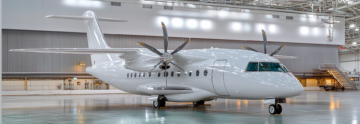This blog explores lesser-known career paths in aviation, highlighting their importance, growth potential, and the skills you’ll need to succeed in these areas.
Flight Dispatcher: The Unsung Hero of Every Flight
Flight dispatchers are the strategic masterminds behind every successful flight. They work closely with pilots to create flight plans that account for factors like weather, fuel requirements, and air traffic regulations. Dispatchers are essentially co-pilots on the ground, monitoring flights in real-time and providing critical updates to ensure safety and efficiency.
Why it’s rewarding:
- Dispatchers are deeply involved in flight operations without the need to be in the air.
- It’s a high-impact role, with your decisions directly influencing the success of flights.
Skills required:
- Strong analytical skills, aviation weather knowledge, and a dispatcher certification (such as the EASA Aircraft Dispatcher Certificate).
Aircraft Maintenance Planner: Behind-the-Scenes Problem Solver
Maintenance planners are the logistical backbone of aviation maintenance operations. They schedule routine maintenance, coordinate repairs, and ensure compliance with airworthiness directives. Their meticulous planning keeps aircraft operational and minimises downtime.
Why it’s rewarding:
- You’ll work at the intersection of engineering, operations, and compliance.
- The role is critical to fleet reliability and overall airline efficiency.
Skills required:
- Knowledge of maintenance procedures, strong organisational skills, and experience with maintenance software systems like AMOS or TRAX.
Aviation Data Analyst: Turning Numbers Into Insights
In the age of big data, aviation companies are increasingly relying on data analysts to optimise operations, improve safety, and enhance customer experiences. From analysing fuel consumption patterns to predicting maintenance needs with AI, data analysts are transforming how airlines and airports operate.
Why it’s rewarding:
- You’ll drive innovation and efficiency in the industry.
- The role offers versatility, with opportunities in airlines, airports, and even air traffic management.
Skills required:
- Proficiency in data visualisation and analysis tools (e.g., Tableau, Python), and an understanding of aviation operations.
UAS (Drone) Operator: Exploring the Frontier of Aviation
The rise of unmanned aerial systems (UAS) has opened new avenues in aviation. From inspecting infrastructure and surveying disaster zones to delivering packages, drone operators are in high demand. As drones become integrated into commercial and public sector operations, this field is growing exponentially.
Why it’s rewarding:
- You’ll work on cutting-edge technology and projects that push the boundaries of traditional aviation.
- The role is diverse, with opportunities in industries like construction, agriculture, and logistics.
Skills required:
- Drone pilot certification, technical proficiency with UAV equipment, and knowledge of airspace regulations.
Aviation Sustainability Specialist: Shaping the Future of Flight
As the aviation industry strives to reduce its environmental impact, sustainability specialists are leading the charge. These professionals develop strategies to lower carbon emissions, promote sustainable aviation fuels (SAF), and implement eco-friendly airport operations.
Why it’s rewarding:
- You’ll contribute to shaping a greener, more sustainable future for the industry.
- Sustainability is a fast-growing area, with opportunities for leadership and innovation.
Skills required:
- Knowledge of sustainability frameworks, environmental policies, and experience in project management or corporate social responsibility (CSR).
Airline Network Planner: Crafting the Perfect Route Map
Network planners are responsible for designing airline route networks to maximise profitability and passenger convenience. They analyse demand, competitor activity, and market trends to decide where and when airlines should fly.
Why it’s rewarding:
- You’ll shape the strategic direction of an airline, influencing its market presence and competitiveness.
- It’s a dynamic role that combines analytics, business strategy, and customer focus.
Skills required:
- Strong analytical and forecasting abilities, plus experience with network planning software.
Air Traffic Flow Manager: Optimising the Skies
Unlike air traffic controllers, flow managers focus on the big picture, ensuring smooth traffic across entire regions. They analyse traffic patterns and collaborate with airports and airlines to prevent congestion and delays.
Why it’s rewarding:
- You’ll make a tangible impact on airspace efficiency and passenger satisfaction.
- It’s a role suited for professionals who enjoy solving complex logistical challenges.
Skills required:
- Expertise in air traffic management systems and strong decision-making skills under pressure.
Technical Writer: Bridging the Gap Between Complexity and Clarity
Technical writers create manuals, training guides, and documentation for aircraft systems, maintenance, and operations. Their work ensures that aviation professionals have clear and precise instructions to follow, which is critical in a highly regulated industry.
Why it’s rewarding:
- You’ll combine technical knowledge with communication skills to make a meaningful impact.
- The role often offers flexibility, including remote work opportunities.
Skills required:
- Excellent writing skills, aviation technical knowledge, and attention to detail.
Airport Operations Specialist: The Heart of Airport Efficiency
Airport operations specialists manage the day-to-day functions of airports, from coordinating ground services to ensuring smooth passenger flow. They work closely with airlines, security teams, and air traffic control to keep everything running seamlessly.
Why it’s rewarding:
- You’ll play a key role in ensuring operational excellence at the gateway to air travel.
- The role offers variety, with responsibilities ranging from crisis management to customer experience.
Skills required:
- Strong organisational and communication skills, plus knowledge of airport systems and regulations.
Conclusion
Aviation is a dynamic industry with far more to offer than just cockpit roles. Whether you’re looking to apply your expertise in new ways or pivot to a completely different path, these lesser-known careers provide a wealth of opportunities for growth and innovation. By exploring roles like flight dispatcher, drone operator, or sustainability specialist, you can find a career that aligns with your skills, passions, and goals.
Aviation is evolving—and so can your career. Are you ready to take the next step beyond the cockpit?







